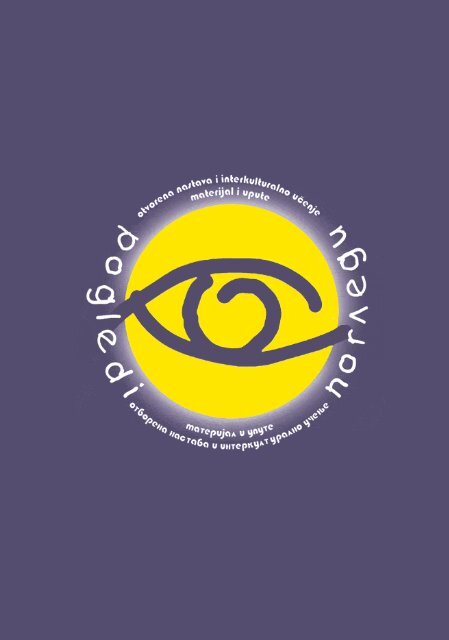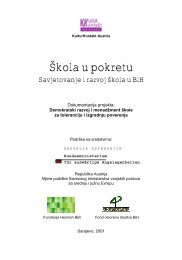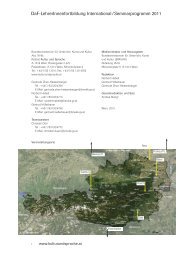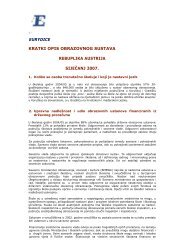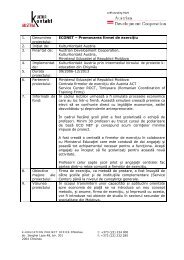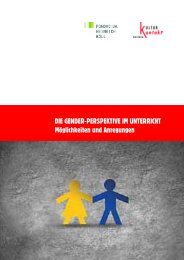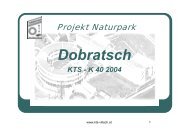Untitled - K-education
Untitled - K-education
Untitled - K-education
Create successful ePaper yourself
Turn your PDF publications into a flip-book with our unique Google optimized e-Paper software.
Project team:<br />
Milka BABI]; Mirsada BARAKOVI]; Maida BAV^I]; Zineta BOGUNI]; Nada ^EVRO;<br />
Hamza DOBRA^A; Sa{a \URI]; Darija \UROVI]; Feriha GALIJATOVI]; Zahida<br />
HRUSTEMOVI]; Du{anka IVANKOVI]; Jadranka KAPETANOVI]; Grozda<br />
MILUTINOVI]; Aida MUMINOVI]; Rabija OSMANAGI]; Dervi{a PLEHO; Rasema<br />
PROHI]; Du{an [EHOVAC; Zakira ZAMETICA<br />
Editorial team:<br />
Milka BABI]; Zineta BOGUNI]; Nada ^EVRO<br />
Scientific consultants:<br />
Margarethe ANZENGRUBER, Secondary High School Vereinsgasse, Vienna, Austria;<br />
Brigitta BUSCH, University of Klagenfurt, Austria; Dietmar LARCHER, University of<br />
Klagenfurt, Austria<br />
Project co-ordinator in Austria:<br />
Maria MARGINTER, KulturKontakt Austria, Initiative South-Eastern Europe<br />
Project co-ordinator in BiH:<br />
Jürgen SCHICK, Austrian Education Co-ordinator for BiH<br />
Project assistants in Austria:<br />
Gertrud LUKACSEK; Rixta WUNDRAK<br />
Project assistant in BiH:<br />
Rasmina MEVKI]<br />
Translators:<br />
Rasmina MEVKI]; Ilvana JAGANJAC<br />
Layout and illustrations:<br />
Aida SMAILBEGOVI]; Sanjin LUGI]<br />
Translation of this booklet:<br />
Nedad MEMI]<br />
Printing:<br />
Srednja grafi~ka tehni~ka {kola, Sarajevo<br />
2<br />
open teaching methods and intercultural learning<br />
views
Introduction<br />
The book pogledi (views) has been developed within the project ”Development of<br />
Supplementary Teaching Materials”, which was implemented by KulturKontakt Austria<br />
in co-operation with the Ministry of Education of the Canton of Sarajevo between 1999<br />
- 2000 with substantial support of the Austrian Federal Ministry of Foreign Affairs and<br />
additional support from the Open Society Fund BiH and the Office of the High<br />
Representative.<br />
pogledi will facilitate intercultural understanding and communication while<br />
simultaneously stressing each constituent people´s right to its own cultural and<br />
linguistic heritage. pogledi is also a remarkable and important step with respect to<br />
including the teaching of both the Cyrillic and Latin alphabet, the shared literal and<br />
cultural heritage of the different communities, and the teaching of all major religions<br />
practised in BiH. The book consists of texts and materials which are reproduced in their<br />
authentic form and language.<br />
pogledi also introduces new approaches in methodology and didactics such as<br />
interdisciplinary teaching, open learning, project learning and simulation games.<br />
With regard to the age group, the supplementary materials are designed in a way<br />
which allows them to be used in the 7th and 8th grades of primary schools as well as<br />
in the 1st grade of secondary schools.<br />
The development of the teaching material was carried out by a local working group<br />
consisting of approx. 20 teachers, school directors, teacher trainers and NGO<br />
representatives from all ethnic groups in Bosnia and Herzegovina. Members of the<br />
working group were selected after consultations with local and international institutions<br />
and organisations.<br />
From the Austrian side, three experts in the field of teacher training, intercultural and<br />
civic <strong>education</strong> and project work acted as moderators of the seminars and consultants<br />
for the development of the teaching material.<br />
pogledi has been approved by the Federal Ministry of Education, Science, Culture<br />
and Sports of the Federation BiH, the Ministry of Education of the Republika Srpska,<br />
and the Ministry of Education and Information of the Sarajevo Kanton.<br />
Soon, pogledi can be downloaded from the internet.<br />
Please visit http://www.kulturkontakt.or.at/kk for further infromation.<br />
open teaching methods and intercultural learning views<br />
3
Project description<br />
Development of Supplementary Teaching Materials<br />
Project aims for citizenship <strong>education</strong> in Bosnia and Herzegovina:<br />
- to produce a visible result which can serve as an example throughout the whole<br />
country by making available teaching materials, which are acceptable for all national<br />
groups in Bosnia and Herzegovina. It should focus on supplementary information<br />
and skills development not contained in the existent textbooks and which shall<br />
facilitate inter-ethnic understanding and co-operation.<br />
- to support the <strong>education</strong>al authorities and the wider <strong>education</strong>al community,<br />
including schools, teachers and parents, with the prospect of offering <strong>education</strong> on<br />
the basis of reconciliation and respect between people of different ethnic groups.<br />
- to offer innovative approaches in methodology and didactics<br />
- to promote networking between teachers and other <strong>education</strong>al experts of all national<br />
groups<br />
Project elements:<br />
- start-up seminar<br />
- consolidation of the group<br />
- definition of possible topics to work on<br />
- definition of a work contract between participants and trainers<br />
- seven seminars<br />
- textbook development (definition of topics, selection and analysis of texts,<br />
compilation of texts and didactic exercises)<br />
- teacher training (new didactic approaches)<br />
- study trip to Vienna, Austria<br />
- innovative school projects and methods of citizenship <strong>education</strong> at Austrian<br />
schools<br />
- research projects on integration and multicultural activities in Vienna<br />
- compilation of the teaching materials<br />
- editorial work by three members of the working group in co-operation with the<br />
Austrian experts<br />
- layout and illustrations<br />
- test phase<br />
- implementation of draft versions of the teaching units in eight schools in Sarajevo,<br />
Rudo, Banja Luka, Konjic and Te{anj<br />
- production and presentation of the teaching materials<br />
- printing<br />
- presentation<br />
- distribution<br />
4<br />
open teaching methods and intercultural learning<br />
views
About the usage of the book<br />
We hope that we can give a small stimulus to the development of school life in Bosnia-<br />
Herzegovina with this collection of materials. We, a group of teachers, headmasters<br />
and psychologists, have been dealing with teaching forms orientated towards students<br />
for two years. The small stimulus we are talking about concerns a role change of a<br />
student: First of all, there is an active, creative student who looks for different solutions<br />
of problems on his/her own. The knowledge he/she needs will be acquired by the help<br />
of a teacher. The student should be able to find information sources independently, to<br />
make connections and to research his living world. In brief: he has to learn to<br />
”discover”.<br />
Of course, the role of the teacher is also changed. In this kind of teaching the teacher<br />
is not only a mediator, but also an advisor and guide to the student on his way to a<br />
bigger independence.<br />
The stimulus we want to give concerns also the teaching contents. We would like to<br />
offer ideas for explaining social and cultural situations of different population groups in<br />
BiH, but also an opportunity to make the borders between one´s own and other<br />
cultures more permeable. This kind of ”intercultural learning” should be brought to a<br />
level where stereotypes and fixed images about ”the other” are diminished. The<br />
different texts in different language varieties of this country should assure that unity is<br />
not lost in differences.<br />
The book ”pogledi” consists of six units dealing with themes concerning the life of<br />
students between 13 and 15 years. It is not aimed to be used in a particular teaching<br />
subject, but it can be used in several different subjects. Although each teaching unit is<br />
separate, there are some didactical and structural principles common to all six units.<br />
open teaching methods and intercultural learning views<br />
5
Every unit contains:<br />
- a goal essay which briefly describes intentions and theoretical background<br />
- general, social and intercultural goals<br />
- didactical possibilities of a theme treatment explaining the students the essence<br />
of the theme<br />
- stimulus to a role-play or a simulation game<br />
- project suggestion<br />
- collection of texts (literary texts, newspapers, theoretical texts, instructions and<br />
directions, advertisements, commercials...)<br />
- at lest one text in English<br />
In the annex the teaching forms suggested for the units are extensively explained<br />
(intercultural learning, project teaching, role-play, simulation games, open learning<br />
forms).<br />
The teaching units should be understood as suggestions. The task of the teacher would<br />
be to adjust the teaching units to a context of a particular school and its students and<br />
to change, add or to reduce the units if needed.<br />
It is clear that the teacher should make him/herself familiar with the structure and<br />
contents of each unit he/she wants to work on with the students. It would be good to<br />
gain the co-operation of colleagues from other teaching subjects (team teaching).<br />
Project Team<br />
6<br />
open teaching methods and intercultural learning<br />
views
pogledi<br />
Contents and summary<br />
1. Cricket and Ant<br />
2. Who am I<br />
3. How free is the free time<br />
4. The Wishing Table<br />
5. Profession - Work - Earnings<br />
6. Living World - Water<br />
7. Annex: Additional instructions and suggestions for teachers<br />
a. Open Learning forms<br />
b. Project teaching<br />
c. Intercultural <strong>education</strong><br />
d. Role plays<br />
e. Simulation games in intercultural <strong>education</strong><br />
f. Suggestions on how to work with literary texts<br />
open teaching methods and intercultural learning views<br />
7
1. Cricket and Ant<br />
Goal Essay:<br />
Art and work are the same. But how to prove it Examining life around us, we can see<br />
that after each working activity there is a period of relaxation and rest sought by our<br />
organism itself. It gets worn out by work. How can we enjoy the relaxation and at the<br />
same time collect new energy for work. It would be good to wander off into music,<br />
relaxing and enjoying it. We can go to an exhibition and sit for a while in front of some<br />
picture and enjoy again. But, what if it is our profession, if we live from it A painter can<br />
rarely live from the pictures he sells (exceptions don´t confirm the rule) or a musician<br />
from his compositions (e.g. Mozart died in poverty and was buried in a collective<br />
crypt...). In rare bright moments in history only the wealthy could enjoy art. Everyone<br />
else was either a slave or a physical laborer, a servant... Has a lot changed<br />
General goals:<br />
- introduction to the importance of work<br />
- getting acquainted to different kinds of art<br />
- role of work and art in an everyday life<br />
- better introduction to those artists that<br />
perform other sorts of work<br />
Intercultural goals:<br />
- students can be introducted to artistic<br />
and cultural differencies of nations in BiH<br />
Social goals:<br />
- to perceive that art is a form of life and<br />
existence<br />
- to perceive that effort and persistence are<br />
also important in art<br />
- to perceive that these characteristics can<br />
contribute both in work and in art to prevail<br />
over the social borders<br />
8<br />
open teaching methods and intercultural learning<br />
views
Elements of this unit and texts and images used:<br />
1. Possibility of introducting the theme<br />
2. Methodical instructions of texts and images<br />
3. Material<br />
! Ismet Bekri}, Daddy´s third shift (Poem)<br />
! Ivo Andri}, Aska and the wolf (Literary text)<br />
! [ukrija Pand`o, On the other river bank (Literary text)<br />
! @eljko Ivankovi}, Sad history of the alchemist Ambrosius (Literary text)<br />
! E. Dragulj, It was all better a hundred years ago (Newspaper article)<br />
! S. Alagi}, When a professor, lawyer, clerk, dentist begins to sing... (Newspaper<br />
article)<br />
! Nada ^evro, Survey<br />
! Ant and chestnut (Cartoon)<br />
! Guido Tartaqa, My neighbour-florist (Poem)<br />
! Pablo Picasso (Internet article)<br />
! Wolfgang Amadeus Mozart (Internet article)<br />
! Ismet Mujezinovi}, Mixer (Picture)<br />
! Edgar Degas, Ballet scene (Picture)<br />
! Cricket and ant (Cartoon)<br />
4. Role plays<br />
- Party<br />
- A boy´s birthday<br />
5. Projects<br />
- Ant<br />
- Cricket<br />
6. Reflexion<br />
open teaching methods and intercultural learning views<br />
9
2. Who am I<br />
Goal Essay:<br />
Who am I depends on how I see myself and how others see me. Since everybody<br />
doesn´t see me the same way, I have to face many unusual images. One´s self-image<br />
is formed under the influence of the environment - family, school, neighbourhood,<br />
friends, ethnic group...<br />
The primary environment of each child is his family. Upbringing within the family comes<br />
first and it is a specific and irreplaceable influence on the development of a child. The<br />
family as a social institution is replaceable. The school is the first institution after the<br />
family which has a big influence on<br />
forming the self-image and whose primary<br />
task is help in forming the identity.<br />
Friendships enable us to get out of<br />
ourselves and find inother persons our<br />
enrichment in differencies as well as in<br />
similarities. The child´s environment<br />
(neighbours, houses, buildings, orchards,<br />
meadows, rivers, car parks) influences the<br />
forming of self-attitudes, moral and<br />
intercultural values and the level of<br />
ecological conscience. The relationship to<br />
neighbours is different in different cultural<br />
surroundings, as well as the relationship to<br />
the environment.<br />
General goals:<br />
- to perceive their own position within the family; who makes decisions in important<br />
life situations<br />
- to study the relationship student - teacher due to the perception of the student´s<br />
position in the school surrounding<br />
- finding their place in the group, interactions, adjustability to the group,<br />
relationship to persons of the same age<br />
- establishing the balance between the personal and collective identity<br />
- developing tolerance and democracy<br />
- each student will be familiarized with the research methods (questionnaire,<br />
survey, interview)<br />
10<br />
open teaching methods and intercultural learning<br />
views
Intercultural goals:<br />
- to percive that in one´s own cultural identity there is always the cultural identity of<br />
some other group<br />
- become sensitive to the fact that one´s own identity doesn´t depend only upon<br />
one´s self-image, but also upon the image of somebody else.<br />
Social goals:<br />
- developing the self-respect and respect to others<br />
- to recognize the similarities and differences among different social groups, to be<br />
aware of the danger of insufficient knowledge about the others and about oneself,<br />
to perceive the causes of such an attitude and to find the way of preventing it<br />
- to discover that similarities between different cultures are more<br />
important than the differences<br />
Elements of this unit and texts and images used:<br />
1. Possibility of introducing the theme<br />
2. Methodic instructions of texts and images<br />
3. Material<br />
! Zlatko Basta{i}, Development of basic identity (Specialized literature)<br />
! Fuad Hegi}, Father as a tutor (Specialized literature)<br />
! The key problem is in the family (Newspaper article)<br />
! Sai Baba´s Mahavakya, Communication: To know people (Specialized literature)<br />
! Mujo Slatina, Wonderful love of a mother (Specialized literature)<br />
! Aleksa [anti}, On the holiday eve (Poem)<br />
! Musa ^azim ^ati}, Mosque lamps of the Kurban-Bajram (Poem)<br />
! Hektor Malo, Mother´s home (Literary text)<br />
! Dragan Luki}, What is the father (Poem)<br />
! Matea Baro{, Let´s go to the masquerade (Poem)<br />
! Tanja Dozo, It could be better (Literary text)<br />
! Nikola [ormaz, I struggled not to cry (Literary text)<br />
! Do you make a wish sometimes (Poem)<br />
! Just a picture (Poem)<br />
! Emina, Mara, Ana i Hana (Image)<br />
! Mulan (Film poster)<br />
! Illustrations from the book “In the World of Children´s Justice“<br />
4. Project<br />
- Different families around you<br />
5. Simulation play<br />
6. Reflexion<br />
open teaching methods and intercultural learning views<br />
11
3. How free is the free time<br />
Goal Essay:<br />
Free time suggests the fact that there is a period of time when people can determine<br />
on their own what they want to do. In this teaching unit one should examine if this is<br />
correct.<br />
Social goals:<br />
Goals:<br />
- to become aware of one´s own free time<br />
arrangement<br />
- to perceive the connections between work<br />
and free time more clearly<br />
- to perceive that the consumer society<br />
determines free time<br />
- to examine the change of free time<br />
arrangement in a longer period of time<br />
Intercultural goals:<br />
- to notice that the free time arrangement<br />
depends less on some traditional ethnical<br />
patterns, but is being more determined by the<br />
cultural globalization<br />
- to discover that it is entertaining to spend free time together<br />
- to free oneself of unreachable compulsions of the consumer society<br />
Elements of this unit and texts and images used:<br />
1. Possibility of introducing the theme<br />
2. Project<br />
- Free time now and then<br />
3. Do what you want...<br />
! Antoine de Saint-Exupery, The little prince<br />
(Literary text)<br />
4. Role play<br />
- Weekend for rest<br />
12<br />
open teaching methods and intercultural learning<br />
views
5. To what extent do we determine our free time<br />
! Various advertisements from newspapers, catalogues and the internet<br />
! B. Simi}; Am I web-addicted (Newspaper article)<br />
6. Influence of sports idols<br />
! Ozren Kebo, Private owner in the empire of ball (Newspaper article)<br />
! Mladen Bari{a, \urica Bjedov and - Mate Parlov! (Newspaper article)<br />
7. Free time as a torture<br />
! Various advertisements from newspapers, catalogues and the internet<br />
! Mountaineering (Newspaper article)<br />
8. Some “commandments” about free time<br />
! Bible<br />
! Koran<br />
! Garold S. Kushner, To live!, How do jews live and think (Specialized literature)<br />
! Official bulletin of the Federation of BiH<br />
9. Reflexion<br />
open teaching methods and intercultural learning views<br />
13
4. The Wishing Table<br />
Goal Essay:<br />
Our habits connected with food have many roots. They are founded on religious<br />
regulations, regional conditions (climate, soil humidity), wealth, poverty etc. But at the<br />
present time of globalization those habits are changing quickly. All around the world<br />
the nutrition culture is being standardized. Therefore the life style of youth is also being<br />
changed. In this teaching unit we are talking about the basic research of this question.<br />
Goals:<br />
- to be able to explain different habits connected with nutrition by means of the<br />
process of cultural change<br />
- to perceive that food is a part of everyday culture<br />
- to become aware of one´s own habits connected with food<br />
- to became aware of the globalization influence<br />
Intercultural goals:<br />
- to discover the intercultural character of a local nutrition culture<br />
- to arouse openness and interest for other nutrition cultures<br />
Social goals:<br />
- to learn how to solve disputes over different choice of food (e.g. fast food vs. slow<br />
food)<br />
14<br />
open teaching methods and intercultural learning<br />
views
Elements of this unit and texts and images used:<br />
1. Possibility of introducing the theme (role-play)<br />
2. Examples of the historical development of nutrition culture<br />
! About food (Specialized literature)<br />
3. Project on the examination of changed nutrition habits<br />
4. Foreigners about the bosnian-herzegovinian cuisine<br />
! Lynn Manners, Bosnians (Internet article)<br />
5. Slow food vs. fast food<br />
! Bosnian pot and Fishburger (Recipes)<br />
6. Taste and flavour<br />
! Isak Samokovlija, Porter Samuel (Literary text)<br />
! H.Ch. Andersen, The girl with the matches (Literary text)<br />
! Ivan Cankar, Sketch of my youth (Literary text)<br />
! Mirko Bo`i}, Kurlani (Literary text)<br />
7. Scandals with food<br />
! \urovi}, Fifty tons of dangerous cans in BiH (Newspaper article)<br />
! E. Sara~, Italian pease cans caused the food poisoning of soldiers (Newspaper<br />
article)<br />
! 39 persons poisoned with string beans - One passed away (Newspaper article)<br />
8. Menu is yours<br />
! A pyramid of healthy and regular nutrition (Image)<br />
9. Reflexion<br />
open teaching methods and intercultural learning views<br />
15
5. Profession - Work - Earnings<br />
Goal Essay:<br />
The orienting of the young in the profession world is becoming harder and harder.<br />
Some traditional professions are vanishing, new professions are rapidly changing<br />
profile. On the other hand there are fewer and fewer professions which can be<br />
performed for a whole life period. Everything is in motion and long-term security<br />
doesn´t even exist any more. In this situation it is necessary for young people to learn<br />
how to be informed independently and autonomously about their profession world, as<br />
well as how to adjust themselves to its needs. The traditional school <strong>education</strong> isn´t<br />
enough any more. What is needed is a lot of communication skills, strong selfconfidence<br />
and self-presentation skills. All of these are the theme of this unit.<br />
General goals:<br />
- to meet one´s own wishes concerning a future profession<br />
- to have insight into the profession world<br />
- to learn how to inform oneself independently about job offers<br />
- to acquire the skill of a succesfull self-representation<br />
- to learn to compete<br />
Intercultural goals:<br />
- to acknowledge cultural differences in business communication<br />
- to acknowledge a person´s values according to his/her qualification, not group<br />
belonging<br />
16<br />
open teaching methods and intercultural learning<br />
views
Social goals:<br />
- to find out the role of women in the profession world<br />
Elements of this unit and texts and images used:<br />
1. Possible treatment of the theme<br />
2. Project<br />
- Which profession am I going to choose<br />
3. What can be useful for a curriculum vitae<br />
4. Advertisements<br />
! Various job advertisements (Newspapers)<br />
5. CV examples<br />
! a CV example<br />
! OSCE Application Form<br />
6. In the profession world<br />
! I am a stewardess (Text from a magazine)<br />
! I am a photographer (Text from a magazine)<br />
! Worldwatch job advertisement<br />
7. Pretending...<br />
! Günther Wallraff, Totally down (Literary text)<br />
8. A profession for him or her<br />
! Who have got tougher: Women in the<br />
house or men on the field<br />
(Humorous folktale)<br />
! Philip Webster, Prescott holds the fort<br />
while Blair holds the baby<br />
(Newspaper article)<br />
9.Now and then...<br />
! Ranko Marinkovi}, Carnival<br />
(Literary text)<br />
! Me{a Selimovi}, The fortress<br />
(Literary text)<br />
10. At the working place<br />
! Auto mechanics, nurses - a detail from<br />
the practice, computer worker, waiter<br />
(Images)<br />
11. Simulation play<br />
- Who is going to get a job<br />
12. Reflexion<br />
open teaching methods and intercultural learning views<br />
17
6. Living World - Water<br />
Instead of a goal essay:<br />
“... It has been known for a long time that water is materia prima. Let this whole text<br />
serve us just as an opening of the theme. Cleaning some deserted source. Well,<br />
remember, human, you can´t conquer water! All your production and poisoning in the<br />
author´s opinion is still the production of death and not the production of benefits. In<br />
the struggle to conquer the world, to divide the world, human indisputably loses<br />
himself. Only when the whole planet becomes our homeland, will we be able to<br />
harmonize, to look back and to realize how and who we are living with. You see, the<br />
Almighty Creator gave humans everything they need, here on Earth! But, the problem<br />
with humans is that they divided this planet and created new flocks of sheep and now<br />
from each of them we can hear: This is mine! Therefore some of us even import drinking<br />
water! Some of us are however drowning! I<br />
believe since my childhood that water has<br />
some kind of memory. Where I got that from, I<br />
don´t know. But water remembers for sure. And<br />
each time when you harm it. In its own way,<br />
water remembers it. I am particularly startled<br />
by the fact that nobody dared change this<br />
water, ever. It is there, the same, from time<br />
immemorial. Since it was created. And it is<br />
created too. And, just think, look at a glass of<br />
water you want to drink, it may be that there is<br />
a drop in the same glass which Archimedes<br />
drank, maybe there is a drop from your<br />
mother´s womb where you were for some time.<br />
Have you ever asked yourselves what oil is. A<br />
serious person doesn´t take long. He knows.<br />
Semen one was conceived of consisted of water. In our mother´s womb we were in<br />
water. When we were born, we were bathed in water. And a human is water that walks,<br />
talks, thinks... Somebody passed away, and what happens with the water he/she<br />
contained. Let´s not open some large themes such as: water in the Koran, water in<br />
the Torah, New Testament, water as a choice of life, water as a means of cleaning, water<br />
as a center of rehabilitation. Of course, without water there is no cleaning. Water - that<br />
is in fact cleanliness, not only of the body, but also of the soul. And soul has to be<br />
cleaned also. I talked about this with many conditions and understandings. I especially<br />
mean by that - to understand one another benevolently.“<br />
Source: Alija Dubo~anin, excerpt from the essay, To agree with water / Sa vodom se dogovoriti, Fondeko<br />
Svijet, No. 2, 1997, p. 53.<br />
18<br />
open teaching methods and intercultural learning<br />
views
General goals:<br />
- to perceive the importance of a proper relationship with the environment<br />
- to perceive the role of water in everyday life in our culture and in the world<br />
- to perceive personal possibilities in maintaining the environment, especially water<br />
and its rational use<br />
- to get necessary knowledge about high-quality water<br />
- to learn to present data<br />
Intercultural goals:<br />
- to perceive that water is a common need and property<br />
Social goals:<br />
- to take care of the rational use of water<br />
- to learn argumentative and democratic communication<br />
Elements of this unit and text and images used:<br />
1. Possibility of introducing the theme<br />
2. Methodical instructions<br />
3. Project<br />
- Pollution and cleansing of water<br />
4. Material<br />
! Excerpts from “From drop to fountain“ (Images)<br />
! Excerpts from “Ecological reader“<br />
! Excerpts from Aleksandra Kornhauser, Better knowledge than property,<br />
2 - Wonderful fluid water (Specialized literature)<br />
! Drop by drop (Article from magazine)<br />
! Enes Kari}, Sign of the creation miracle (Newspaper article)<br />
! Mom~ilo Te{i}, Source (Poem)<br />
! Musa ^azim ^ati}, By the Neretva river (Poem)<br />
! Dragoljub Jekni}, Water (Poem)<br />
! Aleksa [anit}, Neretva (Poem)<br />
! Musa ^azim ^ati}, The Bosna ripples... (Poem)<br />
! Jacques Prever, Return to the sea (Poem)<br />
! Vladimir Nazor, Morning sea (Poem)<br />
! Vladimir Nazor, Sea (Poem)<br />
5. Role play<br />
6. Reflexion<br />
7. Project 2<br />
- Water in religion<br />
open teaching methods and intercultural learning views<br />
19
Izdava~:<br />
KulturKontakt Austria<br />
Obala Maka Dizdara 2<br />
BiH-71000 Sarajevo<br />
T +387-33-663 693<br />
F +387-33-664 381<br />
kuko@bih.net.ba<br />
www.k-<strong>education</strong>.at<br />
www.kulturkontakt.or.at/pogledi<br />
20<br />
open teaching methods and intercultural learning<br />
views


